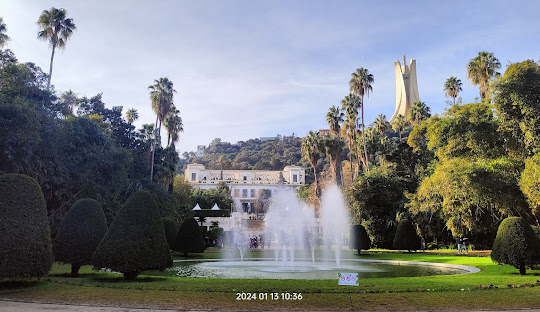Algiers, Algeria
🕌 Algiers, Algeria: The White Pearl of the Maghreb
Where French facades meet Arab-Andalusian soul
🌍 Overview
Nicknamed “Alger la Blanche” (Algiers the White) for its shining white buildings cascading toward the sea, Algiers is a city of striking contrasts and rich history. Perched on the Mediterranean coast, Algeria’s capital blends Arab, Berber, French, and Ottoman influences in its architecture, culture, and cuisine.
With a stunning UNESCO-listed Casbah, grand boulevards reminiscent of Paris, and a seaside corniche with views of azure waters, Algiers is a city waiting to be rediscovered.
🏛️ Top Attractions & Things to Do
🏘️ The Casbah of Algiers (UNESCO World Heritage Site)
A maze of narrow alleyways, traditional houses, and hidden mosques, the Casbah is the historic heart of the city. It offers a journey through time—complete with ornate doors, Ottoman palaces, and resistance history.
🧭 Tip: Hire a local guide to navigate the Casbah and learn its rich stories.
🗼 Martyrs’ Memorial (Maqam Echahid)
A dramatic, modernist monument dedicated to Algeria’s independence fighters. It stands 92 meters high and offers panoramic views of the city and bay.
🕌 Ketchaoua Mosque
Once a cathedral during the French era, it has since been restored as a mosque. Its fusion of Moorish and Byzantine elements is a reflection of Algiers’ layered past.
🏛️ Bastion 23 (Palais des Raïs)
A beautifully restored Ottoman-era palace complex near the waterfront, home to exhibitions, courtyards, and historic ambiance.
🏞️ Jardin d’Essai du Hamma
A lush botanical garden with over 1,200 plant species, peaceful walkways, and tropical zones. It’s perfect for a quiet afternoon.
🍽️ Local Cuisine Highlights
🍲 Chorba Frik
A flavorful tomato-based soup with cracked wheat and lamb, traditionally served during Ramadan.
🥘 Couscous Algérois
Fluffy semolina grains served with chickpeas, vegetables, and a slow-cooked meat stew.
🥟 Bourek
Deep-fried pastry filled with minced meat, egg, and herbs—often served during Ramadan or festive meals.
🧁 Makroud & Zlabia
Traditional Algerian sweets: Makroud (semolina pastry with dates) and Zlabia (honey-soaked spirals).
☕ Coffee & Mint Tea Culture
Try strong black coffee in old-world cafés or fresh mint tea with pine nuts in teahouses.
🏨 Where to Stay
⭐ Luxury: Sofitel Algiers Hamma Garden
Close to the botanical garden and ideal for business or leisure, with a spa, pool, and Mediterranean views.
🏙️ Mid-Range: City Hotel Alger
Comfortable rooms near city center, great for exploring the Casbah and downtown on foot.
💰 Budget: Hotel Samir or Dar El Ikram
Affordable and centrally located options for travelers on a tighter budget.
🎨 Culture & Arts
-
🎭 National Museum of Fine Arts – One of Africa’s largest, with 8,000+ works including Delacroix and Algerian masters.
-
🎶 Raï and Chaâbi Music – Experience live music in cafés or cultural centers.
-
📚 National Library & Cultural Palaces – Frequent exhibitions, music, and literary events.
📸 Best Photo Spots
-
📷 From the top of Martyrs’ Memorial at sunset
-
🏘️ Winding alleys and colorful doors in the Casbah
-
🏛️ French-colonial façades along Boulevard Zighoud Youcef
-
🌊 View from the Corniche road at sunrise
📅 Best Time to Visit
-
Spring (March–May): Mild temperatures, blooming gardens.
-
Autumn (September–November): Warm, fewer tourists.
-
Summer (June–August): Can be hot and humid, especially inland.
-
Winter (Dec–Feb): Rainy but atmospheric, great for urban exploration.
📌 Getting There & Around
-
✈️ Houari Boumediene Airport (ALG) serves direct flights from Europe, Africa, and the Middle East.
-
🚊 Algiers Metro & Trams – Clean and efficient; perfect for central areas.
-
🚕 Taxis are common but make sure to agree on a fare in advance.
-
🚌 Intercity buses connect Algiers with Oran, Constantine, and desert towns.
💡 Travel Tips
🧕 Dress Code
Algiers is modern yet modest. Light, respectful clothing is best. Women travelers may wear jeans and tunics but should carry a scarf for mosques.
🔒 Safety
The city is generally safe, especially during the day. Use caution at night in less populated areas.
💬 Language
Arabic and Berber are official languages. French is widely spoken. English is rare but growing.
💰 Currency
Algerian Dinar (DZD) – cash is king; credit card use is limited to major hotels.
🛍️ Shopping & Souvenirs
-
🧣 Berber textiles and carpets
-
🏺 Ceramics and brass lanterns
-
🧴 Argan oil and perfumes
-
🎁 Traditional kaftans or handmade jewelry
⭐ Destination Ratings
| Category | Rating (Out of 10) | Notes |
|---|---|---|
| Historical Significance | 9.5/10 | Casbah, Ottoman sites, French architecture. |
| Cultural Experience | 9/10 | Deep traditions, music, cuisine, and art. |
| Scenery & Architecture | 8.5/10 | Whitewashed buildings, sea views, historic districts. |
| Food & Culinary | 8/10 | Tasty North African fusion cuisine. |
| Safety & Cleanliness | 7.5/10 | Improving, but infrastructure still developing. |
| Accessibility | 7/10 | Metro is decent, but traffic and taxi systems can be confusing. |
| Affordability | 8/10 | Inexpensive for most travelers. |
| Hospitality | 8.5/10 | Warm, respectful, and curious locals. |
| Adventure Potential | 6.5/10 | Less outdoor adventure, but culturally rich. |
| Overall Travel Value | 8.2/10 | Great for travelers who enjoy history, culture, and authenticity. |


